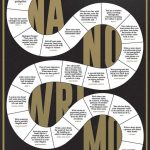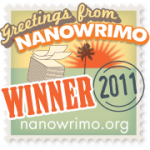From an interview with a literary agent in the fascinating online magazine Guernica, about the agent’s beliefs about talent. He says he means to provoke with the following statement:
“I frankly think that initiatives like National Novel Writing Month are insulting to real writers. We don’t have a National Heart Surgery Month, do we? I’m being intentionally provocative there… I would argue that it takes as much time and work to perfect their craft, in addition to having talent to begin with that most people just don’t. What I really object to is this notion behind these initiatives that anyone can write a novel, and that it’s just a matter of making the time to do it. That’s just not true.”
I got my start in National Novel Writing Month (NaNoWriMo). While the agent admits that it’d be great if someone with talent emerges from NaNoWriMo, he doesn’t think it’s likely
“that, but for National Novel Writing Month, those gifts would go undiscovered.”
They would, he asserts, assert themselves – because a real writer can’t not write. Great writers get Masters of Fine Arts, honing and perfecting until their insistent creative genius gets the air it craves. But undiscovered talent, no… Who is this guy to say where it might sit and under what impregnable wrappings?
When confronted with the lack of diversity in publishing, does he think that non-white, non-male, non-hetero, non-disabled writers are simply not that talented? Of course he wouldn’t say that – who would? But his argument gives extra-special credence to one particular story arc for someone to reach their writing potential. Here’s what it might look like:
The Story Arc of a Young Writer. (Scenario 1) Joe, a young white guy who sees his share of broken dreams and painful world problems while at Brown, decides that he would benefit from some creative writing. His professors – many white males among them – like what he writes about, like his “take” on things, and they encourage him. He applies for and is accepted into a prestigious writing MFA program, AND has the means to accept and pay for it, even if maybe he has to work fifteen hours a week at the university library. His MFA helps his credibility, and then a prominent white guy professor (PWGP) takes him under his wing,
“I swear I see myself in you, Joe, back when I was just getting my start.”
PWGP helps him get an agent for his first, sprawling, high-themed “piece”, and if it’s not eminently successful in terms of the dollars it earns, he gets the acclaim he has been taught to deserve, a “long-listing” or two in novel contests, and Joe continues to write with the tools he has learned, eventually building beautiful sentences, a library of his work, and a career, and goes on to teach at the university, comfortable in the purity of his talent and craft. (I wish I could make a cute little stick-figure video, because I already know I’d have Joe’s hair popping out of his head little by little as he cruises toward this nice ending.)
Scenario 2. The full-time library clerk Joe works with while at university is the daughter of Colombian amnesty seekers, let’s call her Rosalba, and she also works 25-40 more hours a week at a shop in the mall, depending on the season. She fits in 50,000 words in November with NaNoWriMo, continues writing as much as she can during the holidays, and maybe it ends up taking her two, three, five years to finish her book to her own satisfaction. Then she goes online to find a critique partner for free because a pro was going to be $450 that she just couldn’t swing because during those years she actually got married and had a kid and then got divorced, beefed up her hours at the mall to pay for Chinese immersion school so her kid will be trilingual, and took care of her aging parents. She sets about to learning online how to query, tweet pitches, and build an author platform through social media. Rosalba’s work may or not make it to the top of someone’s slush pile, eventually.
I’m not buying the agent’s argument that good writing comes more from Joe than from Rosalba, that talent itself is manifest by its presence and approbation in the likes of Scenario 1. It’s as facile as the argument that Joe is an effete, ivory-tower-isolated, pompous writer whose work can only be enjoyed by insider cretins – an argument I would never make. He could very well write beautifully, magnificently, to make my heart sing or weep – but yeah, he’s also had all the breaks, all the legs-up, and a built-in audience who’s used to reading about themselves. Unlike Rosalba.
Not every NaNoWriMo author will be published, that’s for certain. Some might even be bad writers, with no natural talent. Bad writing is pretty much everywhere, and if you don’t believe me, ask any college professor.
Does the publishing industry screen those bad writers while letting the ones with real talent through? If that were true maybe his argument could sway me. That would mean that I don’t have a book deal yet because I’m not one of those blessed with that raw urgency that pushes my talent out of my talented heart and onto an appreciated page.
But – and hey, correct me if I’m wrong – that’s not how publishing works. There is a full shit-ton of subjectivity, trendiness, and what-will-make-us-money in publishing. Two words to make my case: Dan Brown.
How many people bought his first book? More than 81 million. Perspective data point: Kraft Macaroni ‘n’ Cheese has sold 51 million packets. I don’t like Dan Brown’s books OR Kraft Mac ‘n’ Cheese. I think Brown’s writing sounds computer-generated and that maybe Kraft’s cheese is too. But am I “right”? I am Grand Arbiter neither for publishing nor for prepared foods.
The reading public is not a big homogenous body that selects the books for its feeding frenzies by this agent’s standards, that’s for sure, nor by mine. So writing, as any art form, is thoroughly subjective, and subject to trends. You can see the trends in agents’ Manuscript Wishlists on Twitter and on a certain fun website – steampunk, magical realism, and “grip-lit” like The Girl on the Train, Gone Girl, or some other Girl-y title.
So, place this variability, subjectivity, public fickleness and trend-watching on one side of the balance, and the annual cohort of NaNoWriMo authors on the other. I have a few thoughts about that:
- Among WriMos of my (virtual and real) acquaintance, there isn’t one who isn’t working with others (critique partners, beta-readers, consultants, editors, online courses, or all of the above) all in the service of improving their craft. Whether they have natural talent enough to please Mr. Agent above is an open question; what is clear is that they’re working just as hard as Joe.
- “There’s a lid for every pot,” my friend’s Mexican granny used to tell her. Maybe in and amongst the NaNoWriMo authors, some of the reading public’s as-yet-unfulfilled desires will be good and truly met. Remember Dan Brown’s 81 million copies.
- Anyone can write a novel. It is a jumbled matter of factors within and outside of the writer’s control whether it makes it to print or e-print. Mr. Agent ignores his industry’s role in that jumble.
- People excavate their soul to write. They are emotionally committed, surprised by their own output, desperate to give flight to what’s inside. That agent should check out the NaNoWriMo videos by real people at Project for Awesome to see what I mean by that, and what it means to them. If it takes them the rest of their lives to get that book or their whole oeuvre in shape for publication, or if they NEVER get their work in that kind of shape, who is this guy to tell them it’s not real talent?
On second thought, I hope he never sees those videos. I have a sick feeling about what he’d think of their efforts. Last thing I want to do is unleash a provocative Manhattan cynic amongst all that earnestness, elbow grease, creativity and… (wait for it):
TALENT.







